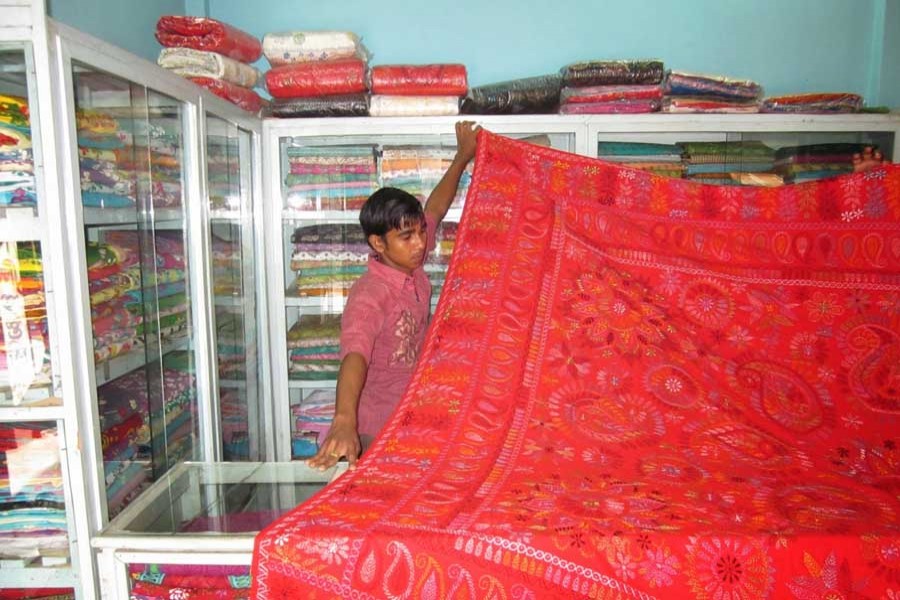The country's biggest hub for embroidered textiles is set to be established in Jamalpur at a cost of over Tk. 21 billion.
Bangladesh Handloom Board finalised the Tk. 21.13 billion project in this connection, which would be placed before the Executive Committee of the National Economic Council (ECNEC), officials told the FE last week.
Starting from this year, the construction of the hub is expected to be finished by 2023 and will be located across two upazilas of Jamalpur.
Once completed, the 300-acre hub to be known as 'Sheikh Hasina Nakshi Palli,' would accommodate almost 1,200 entrepreneurs while tripling the production of embroidery items in the country, government estimates suggest.
"This would be one of the biggest government projects for the whole textile sector in the country", Bangladesh Handloom Board chairman M Rafiqul Islam told the FE.
"It will help create a bigger market for embroidered textiles while generating more than three hundred thousand additional jobs", he added.
Embroidery forms a big part of Bangladesh's traditional textile industry. One notable product is 'Nokshi Kantha' or embroidered quilt, which has found a niche market within the urban middle and upper class people in recent years.
In addition, traditional embroidered bed covers, wall mats, home decors, readymade garments and other textile items are finding their place at the posh outlets of Dhaka while becoming increasingly popular among the urban consumers these days.
"We believe that this industry has a lot of untapped potential and can go a long way, if backed with systematic government patronage and appropriate facilities", Mr Islam said.
"To that end, the planned hub would provide accommodation and workspace for a total of 1,184 entrepreneurs while also featuring warehouse, service and design development centres as well as a sales and exhibition centre," he added.
Apart from basic amenities for embroidered textile, the proposed design of the Nakshi Palli had kept additional space for rest houses, a convention centre and even a theme park.
"The idea is to build this place not only as a textile hub but also as a tourism hub so that it can draw visitors and can become a major attraction within the region", Mr. Islam said.
According to industry insiders, around 1.0 million embroidery pieces are produced in the country annually.
However, relevant project documents support that the annual output of embroideries may hit three million units by 2025, thanks to the new set-up.
Total export income from embroidery items is also likely to reach Tk. 100 million from a paltry amount of Tk. 20 million, officials say.
At the same time, the number of people employed in this industry is also likely to double from three hundred thousand to around six hundred thousand.
"Our study shows that currently an embroidery firm earns on an average Tk. 620 thousand as net profit each year," said Md Ayub Ali, chief of planning of the Handloom Board.
"However, with appropriate research and logistical support from the project, embroiders would be able to earn Tk. 1.74 million, which will be 2.8 times higher than what they are earning now," he said.
When asked why Jamalpur had been chosen as the site for this large project, officials noted that the district had a long tradition of producing embroideries and related crafts.
"Jamalpur has a long association with traditional embroideries including the famous Nakshi Kantha," Mr. Ayub said.
Currently, around three hundred thousand people are directly and indirectly employed in this embroidery industry in Jamalpur while around 300 organisations and entities are dealing with this craft in the district, he added.


